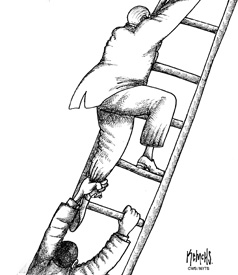Workers in the United States are more productive, per capita, than workers in European nations, according to 2009 federal government statistics.
But does this mean that Europeans are doing something wrong, or do they simply have different priorities than Americans?
This is a question that has often come up lately as commentators compare the economic situations of countries on both continents.
It’s true that French G.D.P. per capita (output divided by the number of people in the nation), for example, is only about three-quarters of the American level, when adjusted for purchasing power. But when you look closely at that number, the story is certainly more complex than many people think.
Let’s look at data released by the Bureau of Labor Statistics in the United States — at data on France in particular, since that’s the country Americans have strong feelings about, right?
I’m going to focus on the data from 2008, not 2009. In 2009, businesses in the United States laid off a lot of workers, while European firms did not. That produced a divergence in productivity that had more to do with short-run business cycle events than with fundamental trends. Data from 2008 allows for a better sense of the underlying differences:
— G.D.P. per capita: Per person, France produces 73 percent of what the United States produces in a year.
— G.D.P. per hour worked: A French worker produces about 99 percent of what an American worker produces in one hour.
— Number of workers: For every 100 workers in the United States, France has about 84 workers.
— Hours per worker: For every 100 hours an American works, a French person works about 88.
So French workers are roughly as productive as American workers. But fewer French people have jobs, and when they have jobs, they work fewer hours.
So why is it that fewer people in France are employed?
During their prime working years, the French are as likely to have jobs as Americans are.
Click here to sign up for Truthout’s FREE daily email updates.
But fewer young people work (in part because the French government offers more generous college aid), and the French tend to retire earlier — French President Francois Mitterrand made early retirement alarmingly attractive in 1983 when he reduced the retirement age from 65 to 60. But that is not a problem caused by weak productivity or mass unemployment.
And why do the French work shorter hours? For the most part, probably because government policies mandate that workers take vacation time.
The bottom line is that France, which has the same levels of technology and productivity as the United States, has made different choices about retirement and leisure.
Vive la difference!
Backstory: A Menu Of Measures
When he delivered his State of the Union address on Jan. 25, President Barack Obama described Americans as being the most productive workers in the world.
Yet in a radio address a few days before, he suggested that workers could be even more competitive in the global marketplace, and vowed to “unlock the productivity” of Americans. Despite the seeming contradiction, both claims can be considered true — depending on how one measures productivity.
The federal government estimates that in 2010 the United States’ gross domestic product — the total value of all goods and services produced annually — was higher than that of any other nation, measured at almost $15 trillion.
When G.D.P is divided per capita, however, the United States slips down the global rankings, falling below countries with smaller populations.
The International Labor Organization, a United Nations agency, uses a different metric to measure productivity: annual output per employed person. According to this measure, in 2008 the United States was indeed the world’s leader.
But some economists contend that neither of these measures is an effective way to assess a nation’s productivity. A more revealing number, they say, is an individual worker’s output per hour worked.
Their rationale: In some countries people work fewer hours because they have more vacation time, shorter work weeks or longer lunches. On a per-hour basis, though, these workers might be just as productive as workers who spend more time at the workplace. And when measured according to output per hour, workers in Norway and Ireland substantially outpaced those in the United States in 2009.
The debates highlight economists’ greatest challenge in calculating productivity: how to compare disparate data from many sources across borders.
© 2011 The New York Times Company
Truthout has licensed this content. It may not be reproduced by any other source and is not covered by our Creative Commons license.
Paul Krugman joined The New York Times in 1999 as a columnist on the Op-Ed page and continues as a professor of economics and international affairs at Princeton University. He was awarded the Nobel in economic science in 2008.
Mr Krugman is the author or editor of 20 books and more than 200 papers in professional journals and edited volumes, including “The Return of Depression Economics” (2008) and “The Conscience of a Liberal” (2007).
Copyright 2011 The New York Times.
Media that fights fascism
Truthout is funded almost entirely by readers — that’s why we can speak truth to power and cut against the mainstream narrative. But independent journalists at Truthout face mounting political repression under Trump.
We rely on your support to survive McCarthyist censorship. Please make a tax-deductible one-time or monthly donation.
